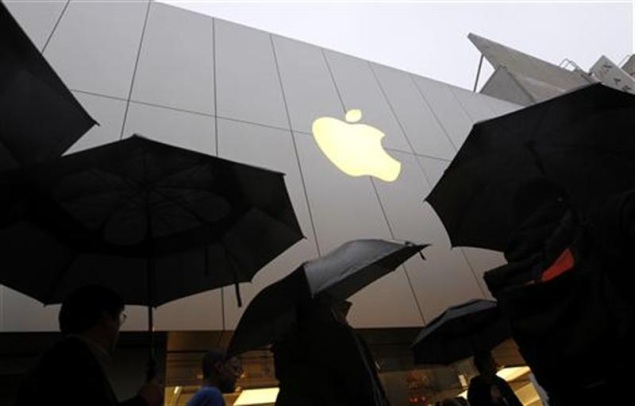- Home
- Others
- Others News
- Ireland says it is not to blame for Apple's low tax rate
Ireland says it is not to blame for Apple's low tax rate
By Reuters | Updated: 21 May 2013 17:31 IST

Click Here to Add Gadgets360 As A Trusted Source

Advertisement
Ireland said on Tuesday it was not to blame for Apple Inc's low global tax payments after the US Senate said the company paid little or nothing on tens of billions of dollars in profits stashed in Irish subsidiaries.
The Irish government, which has seen the luring of U.S. multinationals with low taxes as a key part of its economic policy since the 1960s, said its system was transparent and other countries were responsible if the tax rate paid by Apple was too low.
"They are issues that arise from the taxation systems in other jurisdictions, and that is an issue that has to be addressed first of all in those jurisdictions," deputy prime minister Eamon Gilmore told national broadcaster RTE on Tuesday.
In a 40-page memorandum released ahead of an appearance by Apple Chief Executive Tim Cook before Congress on Tuesday, a Senate subcommittee identified three subsidiaries that have no tax residency either in Ireland, where they are incorporated, or in the United States, where those companies are managed.
The main subsidiary, a holding company that includes Apple's retail stores throughout Europe, has not paid any corporate income tax in the last five years, the report said.
Apple's arrangement has allowed it to pay just 1.9 percent tax on its $37 billion in overseas profits in 2012, despite the fact that the average tax rate in the countries of the Organisation for Economic Co-operation and Development (OECD), its main markets, was 24 percent in 2012.
The report said "Ireland has essentially functioned as a tax haven for Apple".
Gilmore said Ireland was pursuing the issue of international tax avoidance "very strongly" at the European Union and the OECD, which is spearheading initiatives.
The issue will be discussed at a meeting of European Union officials on Tuesday, he said.
The Senate report said a subsidiary with a mailing address in Cork, Ireland's second-largest city, received $29.9 billion in dividends from lower-tiered offshore affiliates from 2009 to 2012, comprising 30 percent of Apple's global net profits.
It said it exploited a difference between Irish and US tax residency rules.
Apple said in a comment posted online on Monday it did not use "tax gimmicks". It said the existence of its subsidiary Apple Operations International in Ireland did not reduce Apple's U.S. tax liability and the company would pay more than $7 billion in U.S. taxes in fiscal 2013.
A number of U.S. multinationals including web search leader Google, online retailer Amazon.com and coffee chain Starbucks have come under criticism for arranging their affairs in a way that leaves them liable to low rates of tax on billions of dollars of overseas sales.
Apple's auditor, Ernst & Young, which also audits Google and Amazon.com, declined immediate comment.
Fiscal attraction
Apple said last year it would add 500 more people to its Cork workforce of 2,800.
Ireland's pro-business tax structures have attracted U.S. multinationals including Google, Microsoft and Facebook, big employers who have helped offset an unemployment rate stuck above 14 percent, but its low corporate tax rate of 12.5 percent has drawn criticism elsewhere in Europe.
The government regularly touts its success in attracting international investment as one of its main achievements, and multinationals, which account for almost 10 percent of Ireland's workforce, have taken the sting out of austerity measures prescribed under an EU/IMF bailout by creating jobs.
U.S. firms invested $30 billion in Ireland last year, more than in China and the rest of emerging Asia combined, according to the American Chamber of Commerce.
In the 1960s Ireland turned around its economy by attracting foreign businesses with tax holidays. After joining what later became theEuropean Union, it was no longer able to do this and instead shifted to a system of low tax rates - currently 12.5 percent - and a light touch approach to tax administration that allows companies to reduce their effective rate much lower.
A raft of mainly U.S. companies have taken advantage of Ireland's tax regime to minimise their tax bills.
Microsoft's Irish base, along with another operation in low-tax Singapore, helped the company pay tax of just 9.4 percent on $21 billion of non-U.S. earnings last year. Google channels most of its overseas profits through Ireland, a practice that allowed it to pay tax at a rate of just 2.6 percent on $6 billion of foreign profits in 2012.
Patrick Coveney, the chief executive of Greencore, one of Ireland largest companies, told RTE radio that it was politicians across the world who were responsible for these tax treaties and tax structures.
"I find it frankly a little frustrating that it is them who are piling in and criticising international traded businesses who are merely availing of the tax environment that they have put in place," said Coveney, a former president of the Dublin Chamber of Commerce.
The Irish government, which has seen the luring of U.S. multinationals with low taxes as a key part of its economic policy since the 1960s, said its system was transparent and other countries were responsible if the tax rate paid by Apple was too low.
"They are issues that arise from the taxation systems in other jurisdictions, and that is an issue that has to be addressed first of all in those jurisdictions," deputy prime minister Eamon Gilmore told national broadcaster RTE on Tuesday.
In a 40-page memorandum released ahead of an appearance by Apple Chief Executive Tim Cook before Congress on Tuesday, a Senate subcommittee identified three subsidiaries that have no tax residency either in Ireland, where they are incorporated, or in the United States, where those companies are managed.
The main subsidiary, a holding company that includes Apple's retail stores throughout Europe, has not paid any corporate income tax in the last five years, the report said.
Apple's arrangement has allowed it to pay just 1.9 percent tax on its $37 billion in overseas profits in 2012, despite the fact that the average tax rate in the countries of the Organisation for Economic Co-operation and Development (OECD), its main markets, was 24 percent in 2012.
The report said "Ireland has essentially functioned as a tax haven for Apple".
Gilmore said Ireland was pursuing the issue of international tax avoidance "very strongly" at the European Union and the OECD, which is spearheading initiatives.
The issue will be discussed at a meeting of European Union officials on Tuesday, he said.
The Senate report said a subsidiary with a mailing address in Cork, Ireland's second-largest city, received $29.9 billion in dividends from lower-tiered offshore affiliates from 2009 to 2012, comprising 30 percent of Apple's global net profits.
It said it exploited a difference between Irish and US tax residency rules.
Apple said in a comment posted online on Monday it did not use "tax gimmicks". It said the existence of its subsidiary Apple Operations International in Ireland did not reduce Apple's U.S. tax liability and the company would pay more than $7 billion in U.S. taxes in fiscal 2013.
A number of U.S. multinationals including web search leader Google, online retailer Amazon.com and coffee chain Starbucks have come under criticism for arranging their affairs in a way that leaves them liable to low rates of tax on billions of dollars of overseas sales.
Apple's auditor, Ernst & Young, which also audits Google and Amazon.com, declined immediate comment.
Fiscal attraction
Apple said last year it would add 500 more people to its Cork workforce of 2,800.
Ireland's pro-business tax structures have attracted U.S. multinationals including Google, Microsoft and Facebook, big employers who have helped offset an unemployment rate stuck above 14 percent, but its low corporate tax rate of 12.5 percent has drawn criticism elsewhere in Europe.
The government regularly touts its success in attracting international investment as one of its main achievements, and multinationals, which account for almost 10 percent of Ireland's workforce, have taken the sting out of austerity measures prescribed under an EU/IMF bailout by creating jobs.
U.S. firms invested $30 billion in Ireland last year, more than in China and the rest of emerging Asia combined, according to the American Chamber of Commerce.
In the 1960s Ireland turned around its economy by attracting foreign businesses with tax holidays. After joining what later became theEuropean Union, it was no longer able to do this and instead shifted to a system of low tax rates - currently 12.5 percent - and a light touch approach to tax administration that allows companies to reduce their effective rate much lower.
A raft of mainly U.S. companies have taken advantage of Ireland's tax regime to minimise their tax bills.
Microsoft's Irish base, along with another operation in low-tax Singapore, helped the company pay tax of just 9.4 percent on $21 billion of non-U.S. earnings last year. Google channels most of its overseas profits through Ireland, a practice that allowed it to pay tax at a rate of just 2.6 percent on $6 billion of foreign profits in 2012.
Patrick Coveney, the chief executive of Greencore, one of Ireland largest companies, told RTE radio that it was politicians across the world who were responsible for these tax treaties and tax structures.
"I find it frankly a little frustrating that it is them who are piling in and criticising international traded businesses who are merely availing of the tax environment that they have put in place," said Coveney, a former president of the Dublin Chamber of Commerce.
© Thomson Reuters 2013
Comments
Catch the latest from the Consumer Electronics Show on Gadgets 360, at our CES 2026 hub.
Related Stories
Popular on Gadgets
- Samsung Galaxy Unpacked 2025
- ChatGPT
- Redmi Note 14 Pro+
- iPhone 16
- Apple Vision Pro
- Oneplus 12
- OnePlus Nord CE 3 Lite 5G
- iPhone 13
- Xiaomi 14 Pro
- Oppo Find N3
- Tecno Spark Go (2023)
- Realme V30
- Best Phones Under 25000
- Samsung Galaxy S24 Series
- Cryptocurrency
- iQoo 12
- Samsung Galaxy S24 Ultra
- Giottus
- Samsung Galaxy Z Flip 5
- Apple 'Scary Fast'
- Housefull 5
- GoPro Hero 12 Black Review
- Invincible Season 2
- JioGlass
- HD Ready TV
- Laptop Under 50000
- Smartwatch Under 10000
- Latest Mobile Phones
- Compare Phones
Latest Gadgets
- OnePlus Turbo 6V
- OnePlus Turbo 6
- Itel Zeno 20 Max
- OPPO Reno 15 Pro Mini 5G
- Poco M8 Pro 5G
- Motorola Signature
- Vivo Y50e 5G
- Vivo Y50s 5G
- Lenovo Yoga Slim 7x (2025)
- Lenovo Yoga Slim 7a
- Realme Pad 3
- OPPO Pad Air 5
- Xiaomi Watch 5
- Huawei Watch 10th Anniversary Edition
- Acerpure Nitro Z Series 100-inch QLED TV
- Samsung 43 Inch LED Ultra HD (4K) Smart TV (UA43UE81AFULXL)
- Asus ROG Ally
- Nintendo Switch Lite
- Haier 1.6 Ton 5 Star Inverter Split AC (HSU19G-MZAID5BN-INV)
- Haier 1.6 Ton 5 Star Inverter Split AC (HSU19G-MZAIM5BN-INV)
© Copyright Red Pixels Ventures Limited 2026. All rights reserved.

















